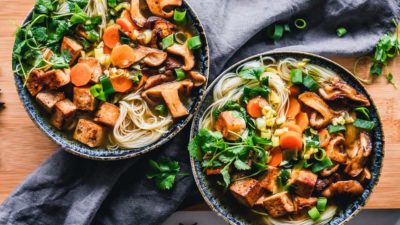FAQs – vegan sports nutrition

It may seem daunting to change your diet but we’ve made it easy for you with our helpful guide – Making the Change. It has everything you need to know to make your lifestyle change a roaring success!
Not at all. If you eat enough food in a day to meet you energy needs and make sure to include good protein sources, such as beans, lentils, chickpeas, nuts, seeds and wholegrains in your meals, you can’t go wrong. It is a myth that it’s hard to get enough protein on a vegan diet. Read more on protein.
Some people think you need meat to build muscle. This logic doesn’t stand up to scrutiny because your body breaks down the protein you eat and uses the constituents for multiple purposes, including building muscle. Plant protein provides all the essential protein building blocks and is in no way inferior to animal protein. In fact, it’s better in its effects on your body because plant protein produces less acid when digested. Less acid means less strain on your kidneys and less calcium used up to neutralise it. Plant protein is not only sufficient to meet all your body’s demands but its beneficial effects have been so widely recognised that it’s now recommended for good health and disease prevention. Read more in The Vegan Edge.
Most people report more energy when they go vegan! Of course, you need to eat a bit more than you were used to and you should focus on wholefoods but if you do that, your energy levels will shoot up. It’s due to the complex carbs in plant wholefoods providing long-lasting, healthy energy and high amounts of antioxidants protecting your tissues from damage and speeding up recovery.
Read more in The Vegan Edge and What to Expect.
If you include all the Essential Food Groups in your diet, you will automatically get most nutrients you need. There are three essential nutrients to be specially mindful of – vitamin B12, vitamin D and iodine, but these aren’t just important for vegans – most people need to watch they have a sufficient intake of these three nutrients. We outline all you need to know about them in Essential Food Groups too.
Absolutely! Changing your diet to a wholefood vegan one will boost your energy levels, stamina, digestion, recovery, and it will even improve your lung capacity and sleep. See all about the exciting benefits you can expect in The Vegan Edge.
Yes, and no. There are plenty of good carbs in plant wholefoods and you absolutely shouldn’t limit your intake of those – fruit and vegetables, wholegrains and pulses. These foods provide healthy energy and a myriad of essential nutrients.
On the other hand, you should limit refined carbs – sugar, white bread, white rice, cornflakes, sweets, processed snacks etc. These provide fast energy but not much else. Unless you’re in the middle of a marathon when you need a quick energy boost, stay away from these. Read more about carbohydrates.
Gluten is a name for a group of proteins found in many grains, including wheat, spelt, rye, barley and products made from them. Most people can digest gluten without any problems and unless you suffer from any of the below, you don’t need to worry about it.
If you have coeliac disease (gluten intolerance), gluten sensitivity or wheat allergy, you will have to avoid gluten. The symptoms vary from severe, such as diarrhoea, anaemia and severe fatigue, to mild, such as bloating and stomach discomfort. If you have a suspicion you don’t tolerate gluten, either have tests done or try to cut gluten out to see if it makes a difference.
Every day, there are media articles announcing new discoveries about nutrition and health and more often than not, they contradict yesterday’s news. That doesn’t mean nutrition advice changes. These articles tend to exaggerate scientific findings, misinterpret them and draw sensationalist conclusions from almost anything. Add in the fact that many studies are funded by industries with their own interests skewing the results and you have the perfect storm for confusion.
However, all the reputable, leading health organisations and nutrition groups agree that we should build our diets around these Essential Food Groups for good health and chronic disease prevention.
Omega-3s from plants come in the form of ALA (alpha-linolenic acid) which our bodies convert to EPA (eicosapentaenoic acid) and DHA (docosahexaenoic acid). Fish oils contain ready-made EPA and DHA which is why some people think they are better. However, fish are so contaminated with heavy metals (mercury, cadmium, lead) and pesticide residues that consuming fish and/or their oils is not a smart choice – it’s the reason pregnant women and small children are warned against their consumption. If you’d rather take a supplement than rely on foods alone, go for algal omega-3s – marine algae manufacture EPA and DHA (that’s where fish get theirs from after all) and supplements made from them are a super-healthy choice.
Rich sources of plant omega-3s are flaxseed, hempseed, chia seeds and walnuts – and oils made from them (use cold to preserve nutritional value), and cold-pressed rapeseed oil to use for cooking.
The scare stories usually feature compounds called isoflavones or phytoestrogens. These behave somewhat like the female oestrogen hormone but are extremely weak – between 1,000 and 10,000 times weaker. They aren’t strong enough to disrupt your hormonal balance and there are many human studies confirming the safety of soya. In fact, soya has a number of health benefits including cholesterol-lowering properties, decreasing the risk of some cancers and supporting bone health. Soya may also combat menopausal symptoms.
On the other hand, there is a good reason to be worried about the hormones in milk and dairy products. Two-thirds of UK cow’s milk comes from pregnant animals, when their hormone levels are sky high – there are, in fact, 35 different hormones and 11 growth factors as well! These hormones are many times stronger than phytoestrogens and have been linked to cancers of the breast, ovaries, prostate and colon.
Our factsheet, The Safety of Soya, provides all the facts on the health benefits and the supposed risks of the humble soya bean, and examines the latest science on soya. And for more info, see our comprehensive guide The Soya Story.
Mock meats are usually made of soya protein isolate (also known as textured vegetable protein or TVP), which isn’t ideal because in order to isolate protein from soya, multiple solutions are used and there’s nothing but protein left from the soya bean. However, soya-based mock meats tend to be low-fat sources of quality protein and if you don’t eat them daily, can be a healthy addition to your diet, especially if eaten alongside vegetables and wholegrains.
But not all mock meats are the same! Tofu-based sausages or hot dogs are actually a healthy food! It’s because tofu is made from whole soya beans and contains most of the nutrients found in the bean – protein, healthy fats, iron, magnesium, potassium, some B vitamins and calcium.
Other mock meat products vary a lot and can be made of a wide variety of ingredients so always read the ingredients. As a rule of thumb, they usually can be a part of a healthy diet but make sure to also eat some wholefood sources of protein, such as lentils, beans, chickpeas, edamame, tofu or tempeh.
Basic foods we rely on for sustenance and nutrition – fruit and vegetables, pulses, nuts and seeds, wholegrains – can be easily affordable for all and if you’re clever, you can get them at half the going price. Here’s how to do it:
- Nuts, seeds, dried fruit – don’t buy small packs or snack-sized deals near tills as these are the most expensive. Bigger packs are usually in or near the baking section and tend to be considerably cheaper. Better still, buy large bags in health food shops, fill your own bags from the big tubs in bulk stores or order online.
- Fruit and vegetables – your best bet may be a local shop as they often have better prices than supermarkets. However, supermarkets always put fruit and veg on sale at reduced prices even when it’s still perfectly edible – so look out for good deals. With more expensive produce such as cherries, berries, edamame or green beans, buying frozen is cheaper and the nutrition quality is similar to fresh.
- Beans, peas, chickpeas and lentils – pulses – are cheap and nutritious whether you buy them canned or dried to cook at home. Canned beans, chickpeas and lentils don’t lose nutrients like some other canned foods and are money-saving as cooking the same amount at home would use up more energy. The other energy-efficient option is to cook them from dry, after soaking, in big batches and freeze what you don’t use. The exception is peas – best bought frozen and cooked in a few minutes.
- Wholegrains – bread can be pricey but the cheapest – and healthiest – option is usually wholemeal pitta or, if you feel inclined, bake your own! When it comes to grains such as brown rice, oats, barley, quinoa, bulgur or millet, the same rule applies as for nuts and seeds – the bigger the pack the lower the price! And pasta is an easy one – most supermarkets offer their own brand wholemeal pasta and it’s a lot more affordable than fancy brands, which are hardly any different.
- Tofu, burgers and mock meats – ready-to-use products can drain your wallet fast. Find out where your nearest Asian supermarket is as they often sell tofu at much better prices. Mock meats and burgers are frequently ‘on offer’ in supermarkets and health food shops, so when that happens, stock up so you’re not tempted to buy them when the price rises. Check out the freezers first as frozen foods tend to be cheaper.
- Dairy alternatives – supermarket own brand plant milks can be less than half the price of other brands but also watch out for special offers. Soya yoghurt prices vary but they are always cheaper and healthier than coconut yoghurts – remember that when shopping around.
- Energy bars – these are pricey but if you shop around online, you can usually find some good deals. If you have a half-decent food processor, you can make your own at a fraction of the retail price – throw in dried fruit, nuts, oats and if you want, some protein powder and spices, blend and shape!
Focus mainly on complex carbohydrates and protein, and minimise your fat intake. That means eating mostly wholegrains, fruit and vegetables, pulses and products made from them, whilst watching your intake of nuts and seeds (do eat some, just not too much), added oils and fats, and processed foods. Cut out all refined carbs, such as white bread, white rice, cornflakes, sugar, crisps and biscuits. That way, you will still get plenty of essential nutrients and you’ll minimise all the unnecessary stuff that your body stores as fat.
Making your diet healthier and being physically active is much better than limiting your overall food intake.
There’s no way around it – you’ll have to eat a lot of healthy foods! Big portions of muesli/oats for breakfast with added nuts and seeds, extra portions of wholegrains and pulses with your main meals, meal-sized snacks. But that’s not where it ends – you can increase the calorie and nutrition content of your meals with these tricks:
- Add nut butters and oats to your smoothies
- Add tahini (sesame seed paste) to savoury dishes
- Add protein powders to your breakfast, smoothies and snacks
- Snack on nuts and sprinkle seeds on top of your meals
- Don’t fill up on empty calories – sweets, crisps or pastries – make sure to focus on wholefoods
- Have a pre-bed snack
It may take a while for you to figure out how much food is enough for you but that’s a part of the process. Once you find your balance, you won’t look back!
A varied, wholesome vegan diet provides almost all essential nutrients in sufficient quantities. The truth is that modern food production systems and lifestyles make it more difficult for everyone – vegan or not – to get all they need from diet alone. It doesn’t mean a vegan diet is unnatural or unhealthy, in fact the opposite is true. It means that how we grow, produce and consume food has changed and, with an ever-growing population, the demands on the systems that produce our food are so high that certain nutrients become harder to obtain.
There are three essential nutrients to watch out for – vitamin B12, D and iodine but these aren’t just important for vegans – absolutely everyone needs to watch they have a sufficient intake. We outline all you need to know about them in Essential Food Groups.
You need to ensure sufficient intake but you don’t need extra high amounts. See the page Nutrition Basics for an overview of recommended intakes and where to get these minerals from. A wholefood vegan diet provides adequate amounts of all three of these nutrients.
You do lose some calcium through sweating so if your training is intensive and makes you sweat a lot, you may need a little more calcium either in your diet or via electrolyte drinks. However, taking a calcium supplement is not recommended because too much calcium can interfere with the absorption of other minerals, including iron and zinc. It’s better to have an extra serving of almonds, tahini or calcium-fortified plant milk.







